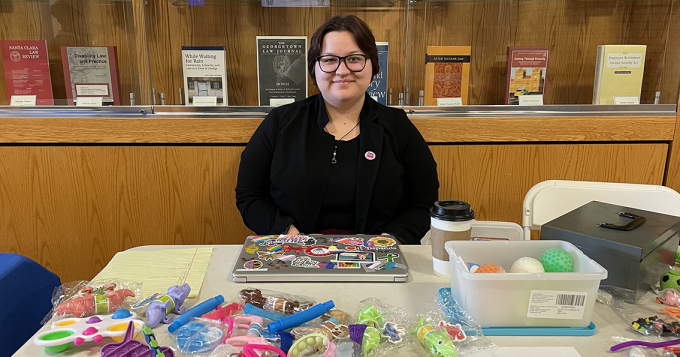
Ron LaPort ’24, president of the new student group, Law Students with Disabilities and Neurodivergencies, at their spring fundraiser.
New student group supports students with disabilities or neurodivergencies
“I want to make sure people know that it is OK to struggle,” says second-year UB School of Law student Ron LaPort ’24 (they/them).
That’s something most—likely all—law students experience as they adjust to the daily rigors of legal education. And those with disabilities or neurodivergencies know the struggle all too well.
Supporting those scholars is the focus of a new student group at the law school, called Law Students with Disabilities and Neurodivergencies. LaPort, who uses a cane to manage their spastic diplegia symptoms, says the idea for the group came in a casual conversation with another student. “They have their own invisible disability,” LaPort says, “and they felt they could talk to me about it. There’s a camaraderie there.”
The realization came that there’s strength in shared experiences, and the student support group was born. As the name indicates, it’s intended to support students with physical disabilities as well as neurodivergencies, including those on the autism and Asperger’s spectrum. Allies are welcome as well.
“It’s not just for people who have visible disabilities,” LaPort says. “It’s important to know that neurodiverse people don’t always present as disabled and don’t always label themselves as disabled. And some people with disabilities don’t label themselves as neurodivergent.”
LaPort says many students first come to terms with a condition like ADHD only when they get to law school and find that their previous academic strategies aren’t working as they did in undergraduate school. “Law school is so different,” they say. “You’re going from classes that are 55 minutes or 90 minutes to a three-hour class in your 1L year. It can really strain your brain to remain focused for that amount of time, sometimes without a break. Then you have to read all these cases that are not easy to remember, you must take detailed notes—there are all these new aspects to learning.
“So it’s OK to have to learn new coping mechanisms. The group is built around normalizing those kinds of struggles and making sure people don’t feel alone.”
Toward that end, the group is hosting biweekly gatherings, cheekily titled Whine and Cheese, in O’Brian Hall. Students can drop in to, as LaPort says, “eat some cheese, drink some tea and complain. It’s an outlet, and sometimes that’s what people need most.”
Another initiative was a movie night co-sponsored with the OUTLaw student group. They showed Cured, a 2020 documentary about the campaign that led the American Psychiatric Association in 1973 to remove homosexuality from its list of mental illnesses.
They’re also hosting a fundraiser as spring-semester exams approach, selling sensory tools to help with studying. Stress balls work, as well as infinite bubble poppers which you can pop on one side and then flip over and begin again. “Sometimes if you find the right tool, it just clicks and it makes it easy to study,” LaPort says.
In addition to LaPort as president, the group’s executive board includes vice president Isabella Jankowski ’24 (she/her); event coordinator Stephanie Burke ’24 (she/her); Matthew Walker ’24 (he/him), who manages social media; and Nora Colley ’24 (she/her), treasurer.